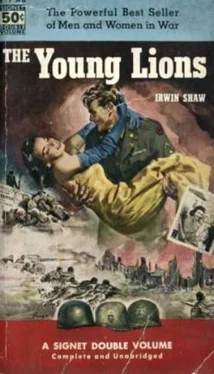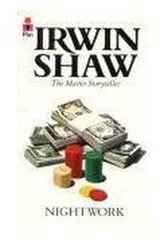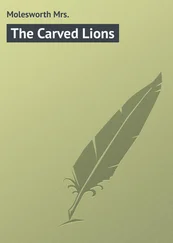Irwin Shaw - The Young Lions
Здесь есть возможность читать онлайн «Irwin Shaw - The Young Lions» весь текст электронной книги совершенно бесплатно (целиком полную версию без сокращений). В некоторых случаях можно слушать аудио, скачать через торрент в формате fb2 и присутствует краткое содержание. Жанр: Классическая проза, на английском языке. Описание произведения, (предисловие) а так же отзывы посетителей доступны на портале библиотеки ЛибКат.
- Название:The Young Lions
- Автор:
- Жанр:
- Год:неизвестен
- ISBN:нет данных
- Рейтинг книги:4 / 5. Голосов: 1
-
Избранное:Добавить в избранное
- Отзывы:
-
Ваша оценка:
- 80
- 1
- 2
- 3
- 4
- 5
The Young Lions: краткое содержание, описание и аннотация
Предлагаем к чтению аннотацию, описание, краткое содержание или предисловие (зависит от того, что написал сам автор книги «The Young Lions»). Если вы не нашли необходимую информацию о книге — напишите в комментариях, мы постараемся отыскать её.
The Young Lions — читать онлайн бесплатно полную книгу (весь текст) целиком
Ниже представлен текст книги, разбитый по страницам. Система сохранения места последней прочитанной страницы, позволяет с удобством читать онлайн бесплатно книгу «The Young Lions», без необходимости каждый раз заново искать на чём Вы остановились. Поставьте закладку, и сможете в любой момент перейти на страницу, на которой закончили чтение.
Интервал:
Закладка:
If they have any sense, he thought, they will be around on our flanks now and preparing to murder us. How could I do it? he thought, staring harshly at the two felled trees silent in the enigmatic shadow a hundred metres away, how could I have fallen asleep? If they had a mortar or a machine-gun placed anywhere in the woods, it would be all over in five seconds. But there was no sound in front of them, just the bird hopping beyond the daisies on the asphalt, making its irritable, sharp cry.
There was a noise behind him and he twisted round. But it was only Maeschen, one of the men from the other two cars, crawling up to them through the undergrowth. Maeschen crawled correctly and methodically, as he had been taught in training camp, with his rifle cradled in his arms.
"How are things back there?" Christian asked. "Anybody hurt?"
"No," Maeschen panted. "The cars are up a side road. Everybody's all right. Sergeant Himmler sent me up here to see if you were still alive."
"We're alive," Christian said grimly.
"Sergeant Himmler told me to tell you he will go back to battery headquarters and report that you have engaged the enemy and will ask for two tanks," Maeschen said, very correct, again as he had been taught in the long, weary hours with the instructors.
Christian squinted at the barricade, low and mysterious in the green gloom between the aisle of trees. It had to happen to me, he thought bitterly. If they find out I was asleep, it will be court-martial. He had a sudden vision of disapproving officers behind a table, with the rustle of official papers before them and he standing there stiffly, waiting for the blow to fall.
"It's damned helpful of Himmler, he thought ironically, to offer to go back for reinforcements. Himmler was a round, loud, jovial man who always laughed and looked mysterious when he was asked if he was any relation to Heinrich Himmler. Somehow it was part of the uneasy myth of the battery that they were related, probably uncle and nephew, and Sergeant Himmler was treated with touchy consideration by everyone. Probably at the end of the war, by which time Himmler would have risen to the rank of Colonel, mostly on the strength of the shadowy relationship, because he was a mediocre soldier and would never get anywhere by himself, they'd find out there was nothing there at all, no connection whatever.
There was no movement behind the barricade. It lay low on the road, its leaves flicking gently now and again in the wind.
"Keep covered," he whispered to the others.
"Should I stay?" Maeschen asked, anxiously.
"If you would be so kind," Christian said. "We serve tea at four."
Maeschen looked baffled and uneasy and blew some dust out of the breech of his rifle.
Christian pushed his machine-pistol through the daisy clump and aimed at the barricade. He took a deep breath. The first time, he thought, the first shot of the war. He fired two short bursts. The noise was savage and mean under the trees and the daisies waved wildly before his eyes. Somewhere behind him he heard grunting, whimpering little noises. Brandt, he thought, the war photographer. For a moment, nothing happened. The bird had disappeared and the daisies stopped waving and the echoes of the shots died down in the woods. No, Christian thought, of course they're not that stupid. They're not behind the block. Things couldn't be that easy.
Then, as he watched, he saw the rifles through chinks high in the barricade. The shots rang out and there was the vicious, searching whistle of the bullets around his head.
"No, oh no, oh, please no…" It was Brandt's voice. What the hell could you expect from a middle-aged landscape painter?
Christian made himself keep his eyes open. He counted the rifles as they fired. Six, possibly seven. That was all. As suddenly as they had begun they stopped.
It's too good to be true, Christian thought. They can't have any officers with them. Probably half a dozen boys, deserted by their lieutenant, scared, but willing, and easy to take.
"Maeschen!"
"Yes, Sergeant."
"Go back to Sergeant Himmler. Tell him to bring his car out on to the road. They can't be seen from here. They're perfectly safe."
"Yes, Sergeant."
"Brandt!" Christian didn't look back, but he made his voice as cutting and scornful as possible. "Stop that!"
"Of course," Brandt said. "Certainly. Don't pay any attention. I will do whatever you say I should do. Believe me. You can depend on me."
"Maeschen," Christian said.
"Yes, Sergeant."
"Tell Himmler I am going to move off to my right through these woods and try to come up on the block from behind. He is to cross the road where he is and do the same thing on his side with at least five men. I think there are only six or seven people behind that barricade and they are armed only with rifles. I don't think there's an officer with them. Can you remember all that?"
"Yes, Sergeant."
"I'll fire once at them, in fifteen minutes," Christian said, "and then demand that they surrender. If they find themselves being under fire from behind, I don't think they'll do much fighting. If they do, you're to be in position to block them on your side. I'm leaving one man here in case they come on up over the barricade. Have you got all that?"
"Yes, Sergeant."
"All right. Go ahead."
"Yes, Sergeant." Maeschen crawled away, his face ablaze with duty and determination.
"Diestl," Brandt said.
"Yes," Christian said coldly, without looking at him. "If you want you can go back with Maeschen. You're not under my command."
"I want to go with you." Brandt's voice was controlled. "I'm all right now. I just had a bad moment." He laughed a little. "I just had to get used to being shot at. You said you were going to ask them to give up. You'd better take me with you. No Frenchman'll ever understand your French." Christian looked at him and they grinned at each other. He's all right, Christian thought, finally he's all right.
"Come along," he said. "You're invited."
Then, with Brandt dragging his Leica, with his pistol in his other hand, thoughtfully at safety, and Kraus eagerly bringing up the rear, they crawled off through a bed of fern into the woods towards their right. The fern was soft and dank-smelling. The ground was a little marshy and their uniforms were soon stained with green. There was a slight rise thirty metres away. After they had crawled over that they could stand up and proceed, bent over, behind its cover.
There was a small continuous rustling in the wood. Two squirrels made a sudden racket leaping from one tree to another. The undergrowth tore at their boots and trousers as they cautiously tried to walk a course parallel to the road.
It's not going to work, Christian thought, it's going to be a terrible failure. They can't be that stupid. It's a perfect trap and I've fallen perfectly into it. The Army will get to Paris all right, but I'll never see it. Probably you could lie dead here for ten years and no one would find you but the owls and the wood animals. He had been sweating out oh the road, and when he was crawling, but now the chill gloom struck through his clothes and the sweat congealed on his skin. He clenched his teeth to keep them from chattering. The woods were probably full of Frenchmen, desperate, full of hate, slipping in and out behind the trees which they knew like the furniture in their own bedrooms, furiously happy to kill more Germans before going down in the general collapse. Brandt, who had lived all his life on city pavements, sounded like a herd of cattle, blundering through the brush.
Why in God's name, Christian thought, did it have to happen this way? The first action. All the responsibility on his shoulders. Just this time the Lieutenant had to be off on his own. Every other moment of the war the Lieutenant had been there, looking down his long nose, sneering, saying, "Sergeant, is that how you have been taught to give a command?" and "Sergeant, is it your opinion that this is the correct manner in which to fill out a requisition form?" and "Sergeant, when I say I want ten men here at four o'clock, I mean four o'clock, not four-two, or four-ten, or four-fifteen, FOUR O'CLOCK, SERGEANT. IS that clear?" And now the Lieutenant was driving happily along in the armoured car, down a perfectly safe road, stuffed full of tactics and Clausewitz and disposition of troops and flanking movements and fields of fire and compass marches over unfamiliar terrain, when all he needed was a Michelin road map and a few extra gallons of petrol. And here was Christian, a dressed-up civilian really, stumbling through treacherous woods in an insane, improvised patrol against a strong position, with two men who had never fired a shot at anyone in their lives… It was madness. It would never succeed. He remembered his optimism out on the road and marvelled at it. "Suicide," he said, "absolute suicide."
Читать дальшеИнтервал:
Закладка:
Похожие книги на «The Young Lions»
Представляем Вашему вниманию похожие книги на «The Young Lions» списком для выбора. Мы отобрали схожую по названию и смыслу литературу в надежде предоставить читателям больше вариантов отыскать новые, интересные, ещё непрочитанные произведения.
Обсуждение, отзывы о книге «The Young Lions» и просто собственные мнения читателей. Оставьте ваши комментарии, напишите, что Вы думаете о произведении, его смысле или главных героях. Укажите что конкретно понравилось, а что нет, и почему Вы так считаете.











